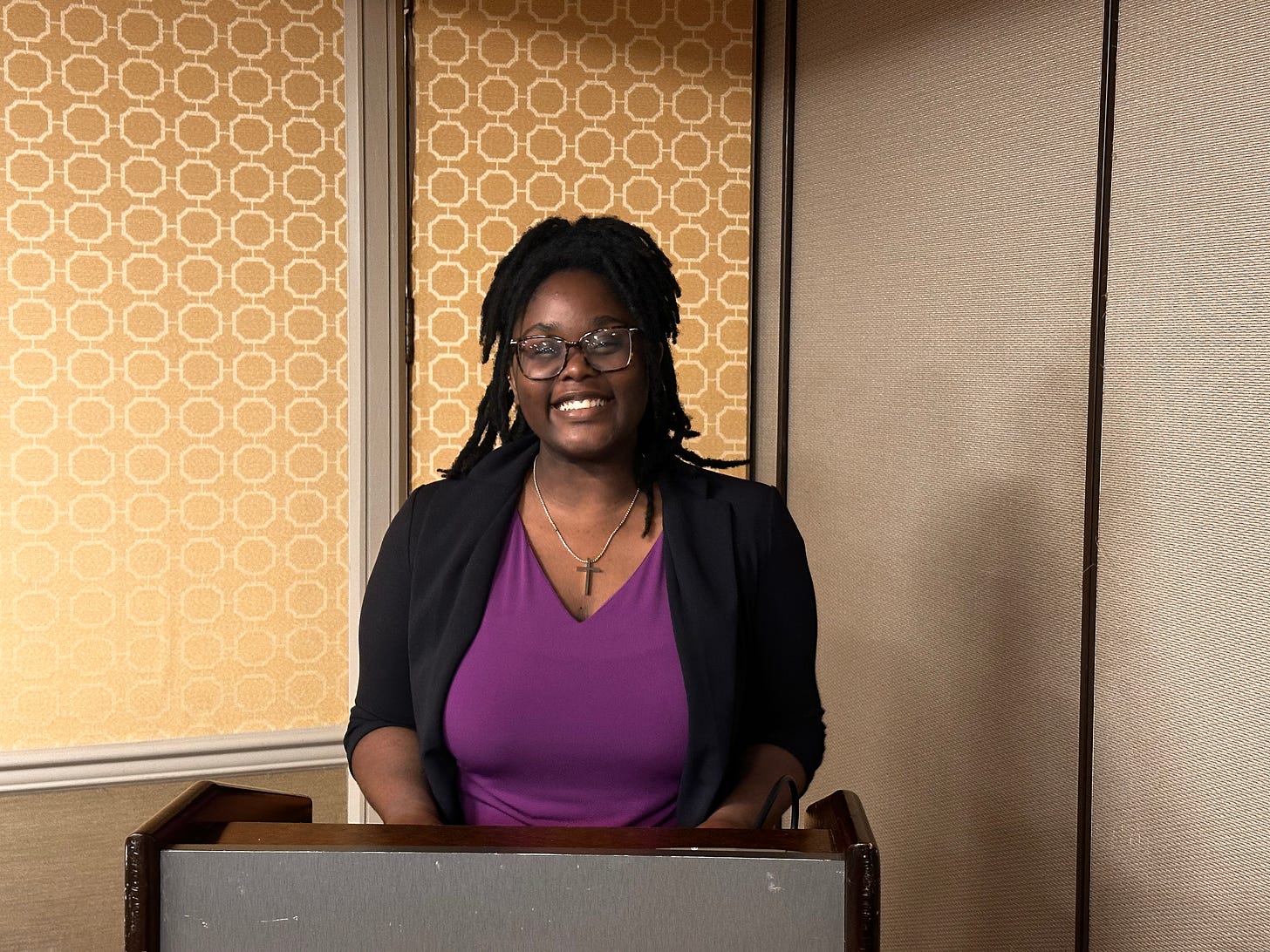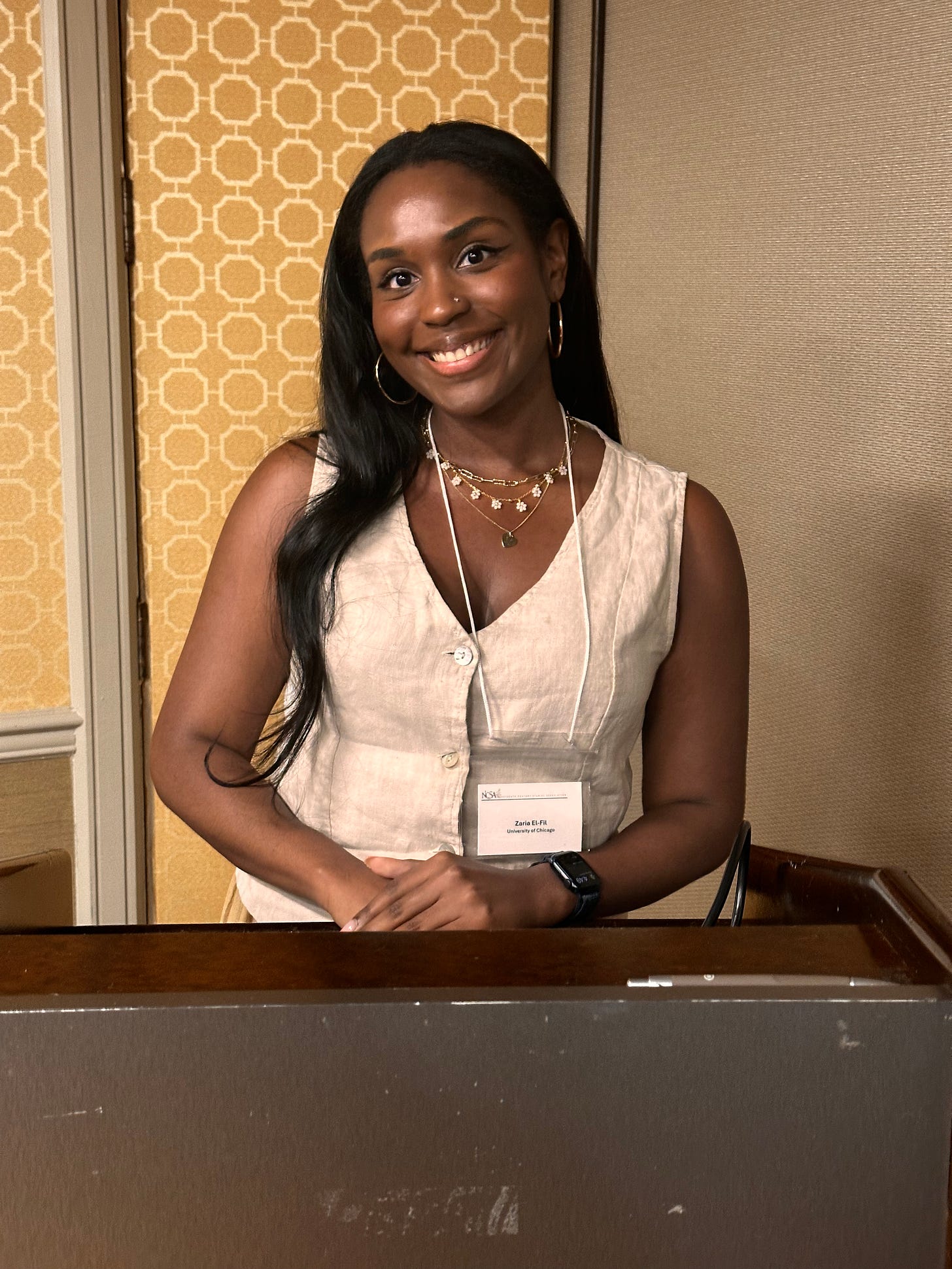The Many Hands of Digital Humanities: Reflections on Pedagogy, Community, and Mentorship in Keywords for Black Louisiana
A new post by Zaria Sawdijah El-Fil reflects on the power of community and mentorship in the digital humanities.
This blog post was written by Zaria Sawdijah El-Fil, reflecting on her time presenting at the Nineteenth Century Studies Association with Keywords for Black Louisiana lab-mates, Jamya Davis and Nyla Williams. She expresses her warmest appreciation for their presence in this lab and sends them the biggest congratulations on graduating this semester!

“Any radical pedagogy must insist that everyone’s presence is acknowledged. That insistence cannot be simply stated. It has to be demonstrated through pedagogical practices.”
― bell hooks, Teaching to Transgress
Digital humanities projects are often measured by their outputs—databases, visualizations, and interactive maps—but rarely do we pause to consider the many hands that make that work possible. At the Nineteenth-Century Studies Association in New Orleans, I had the privilege of witnessing what happens when those hands take center stage. Accompanying Jamya Davis and Nyla Williams, recent graduates of Xavier University of Louisiana, I watched as they presented the work of Keywords for Black Louisiana to a room full of scholars. It was a powerful example of what happens when students are empowered not just to learn but to create, imagine, and lead. The occasion was prompted by Ellie Palazzolo, who has always been a steadfast supporter of collaborative presentations that elevate the remarkable work being done within our project. Our panel, titled Digital Archives of Nineteenth-Century Black History and Culture: An Interactive Presentation, was part of a broader collaboration with two other digital humanities projects.
After the presentation, we took a group picture. I remarked that this would be their final presentation as undergraduates, and it felt important to commemorate the occasion. Since then, Jamya and Nyla have officially graduated, and I’ve found myself reflecting on what that moment signified—not just as a milestone in their academic journeys, but as a testament to the importance of insisting that everyone’s presence is acknowledged, as bell hooks has argued. The presentation marked a moment to surface, honor, and center the presence of our graduating seniors who have put in unimaginable levels of work into this project on top of their packed course schedules and extracurriculars. It also marked a moment to assert their right to occupy that space as digital humanities scholars.
In this blog post, I will discuss my experience at the NCSA conference and tie it into what I believe is one of the core principles of Keywords for Black Louisiana and LifexCode more broadly: pedagogy.
––––––
Our presentation began with a preface:
We are three members of the many that make up the Keywords for Black Louisiana team. Our project is deeply pedagogical, empowering undergraduates and graduates alike to gain valuable experience engaging and presenting in academic spaces.
The audience nodded excitedly at this point and later brought it up in Q&A. The question posed was about how we maintain momentum and a sense of cohesion when we are onboarding and guiding so many students through the process. It was a great question and gave me pause, prompting me to consider what it means to sustain community in the digital humanities.
I can understand the curiosity. Many DH panels tend to highlight directors or principal investigators, obscuring the many hands involved in bringing the project to life and perpetuating the ‘lone genius’ stereotype in the field of technology. Even on our panel, we were joined by faculty and graduate students, many of whom directed or co-directed the projects in question. We were the only panel with undergraduate students, and that did not feature someone acting in a director/administrative capacity. When you peel back the layer of many DH projects, you see a diverse array of people whose labor often goes unacknowledged, from librarians to undergraduate researchers and information technology consultants. Our project intentionally disrupts that pattern. We believe in bringing these hidden figures to the forefront and empowering them to take an active role in the creation and dissemination of our work. This approach requires a reimagining of what momentum and success look like, favoring mentorship, communication, and a sense of community over purely output-driven metrics.
This commitment to pedagogy also relies on people who genuinely believe in the importance of pedagogy and peer uplift. All of the graduate students on the project have a shared sense of responsibility and care with regard to how they interact with undergraduates. I, like many of my colleagues, have been asked to write letters of support for our undergraduate members and always lend a helping hand when they need it. I am thrilled to watch our undergraduates own their voice and intellectual production in this project on panels and presentations, and I am constantly encouraging more of them to take these public-facing leadership roles. We are part of a web of support: faculty and administrators mentor graduate students, who in turn mentor undergraduates. This chain of support is not a byproduct of the project; it is its very essence.
I appreciate how our project prioritizes these forms of community as central to the digital work, not supplementary to it. It reminds me of similar spaces I had in undergrad that nurtured me and saw me as a thinker, not just someone providing hourly labor on transcription work. I still remember graduate students in the Texas Domestic Slavery Project who spent hours helping me prepare for my first conference presentation, teaching me how to write abstracts, and walking me through the nuances of archival research. They could have been doing any number of things, but their commitment to community placed mentorship and sharing knowledge at the forefront. Experiences such as these have shaped how I understand my role in academia and the centrality of collaboration at the heart of everything I do.
In closing, I am honored to have been present for Jamya and Nyla’s last presentation as undergraduates. Their brilliance, generosity, and knack for public speaking were on full display, and I am grateful to have shared that moment with them. It stands as a powerful reminder that the strength of digital humanities lies not just in the projects we build, but in the communities we foster.




